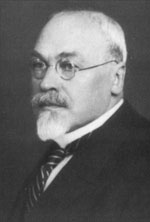Gustavs Zemgals
| Gustavs Zemgals | |
|---|---|
 |
|
| 2nd President of Latvia | |
|
In office 8 April 1927 – 4 September 1930 |
|
| Prime Minister |
Marģers Skujenieks Pēteris Juraševskis Hugo Celmiņš |
| Preceded by | Paul Kalnins (Acting) |
| Succeeded by | Alberts Kviesis |
| Personal details | |
| Born | 12 August 1871 Džūkste parish, Courland Governorate, Russian Empire (Now Tukums Municipality, Latvia) |
| Died |
6 January 1939 (aged 67) Riga, Latvia |
| Political party |
Democratic Centre (1922-1934) |
| Spouse(s) | Emīlija Zemgals |
| Children | 2 |
Gustavs Zemgals (12 August 1871, Džūkste parish, Courland Governorate – 6 January 1939) was a Latvian politician and the second President of Latvia.
Zemgals was born in Džūkste, Latvia. He attended elementary school in a small parish of Saka, and later continued education in Riga Nikolai Gymnasium. He graduated from Moscow University in 1899 with a degree in law. He then returned to Latvia and was a lawyer, a newspaper editor and a political activist.
In 1904, during the Russo-Japanese War, Zemgals was mobilised and sent to the front, where he spent a year and a half and was promoted to the rank of captain.
After his return to Latvia in 1905, Zemgals became one of the creators of a new liberal newspaper "Jaunā Dienas Lapa" (New Day's Page) and proceeded to become an editor of this paper. He was also an editor in the newspaper that succeeded "Jaunā Dienas Lapa" -"Mūsu Laiki" (Our Times). In July 1907, the Riga district court sentenced Zemgals to a three months long arrest for his work at "Mūsu Laiki". Soon after that, Zemgals created the Latvian democratic party together with some other political activities. In the time period between 1912 and 1914 Zemgals also worked on a magazine "Domas" (Thoughts).
When World War I began, Zemgals was once again mobilised and initially assigned to an infantry division in the middle part of Latvia, but later he was sent to Finland. After his return to Riga, Zemgals was elected as the chairman of the city on 23 April 1917. In autumn 1917 the Riga Temporary Council repeatedly elected Zemgals as the chairman of the city. At this time, he was active in the Latvian radical-democratic party.
From 1918, Zemgals became active in the Latvian Provisional National Council, where he worked on matters related to occupied Latvian territories. As a member of the Latvian radical-democratic party, he became the second deputy of the chairman of Tautas Padome (People's Council), a representative body (council) of Latvian political parties and organizations. Holding this office, he chaired the 18 November 1918 meeting of Tautas Padome, which declared the independence of Latvia. On 3 December 1918 he was elected as the chair of Riga City Council.
...
Wikipedia
